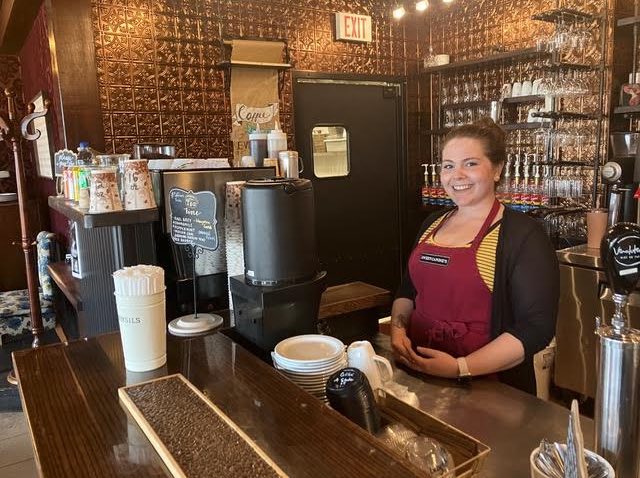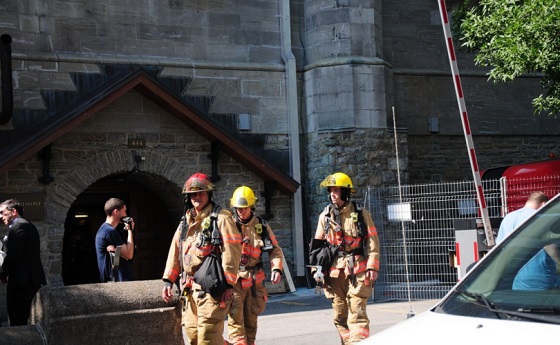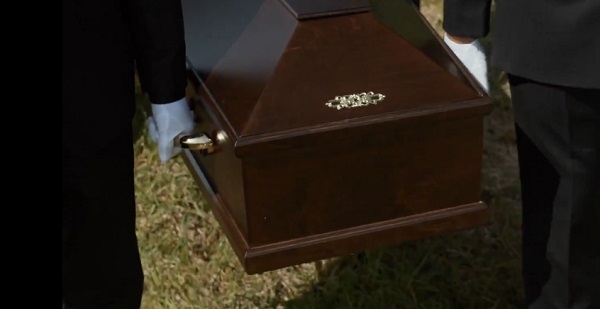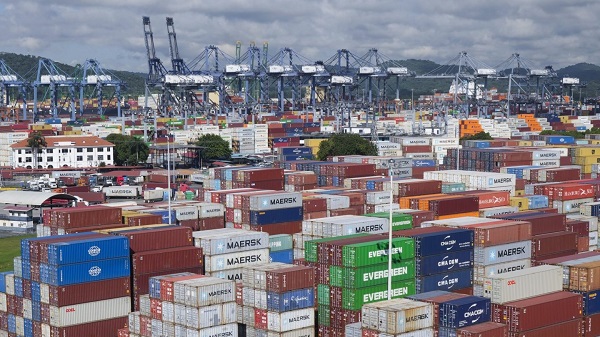Business
Sweet Capones making sweet dreams come true with special training opportunities for employees

Pictured here is Ciarrea Martin, café manager of Sweet Capone’s Red Deer location. The popular bakery is gearing up to launch training programs to help folks have a better chance of landing employment.
By Mark Weber
Known for their scrumptious cannolis, Sweet Capone’s Italian Bakery and Cannoli Shop is now launching what promises to be life-changing training opportunities.
“I was a paramedic before we started Sweet Capone’s and I absolutely loved my job; I loved helping people,” explained Carina Moran who owns the bakery along with her husband Joel.
They first opened the popular establishment six years ago, having since expanded to Lacombe as well. An injury forced a shift in direction from being a paramedic, and thus the establishment of Sweet Capone’s – which has met with tremendous success.
“I first started selling our family’s cannolis out of our house, but I always felt that the shop needed to stand for something much more – that was always on my heart,” she said. “We’ve always been ‘seeding’ into organizations around us – we’ve been helping local soup kitchens, homeless shelters and women’s shelters by giving donations. It’s a wonderful way to help, but I think the thing we have always had an issue with that it never felt like it was enough,” she said, adding that she has felt how vital it is to support those need help – particularly folks who need a hand in landing employment. “There are people who are constantly looked over – they want to have job skills, and they want others to take a chance on them, but they are often given a pass.”
To date, Carina and Joel have made it a priority to hire those who could use an opportunity to put their gifts and skills to work, but just haven’t been given the chance.
Take Ciarrea, who manages the café in the Red Deer location. A single mom at a young age, she didn’t have managerial experience at first.
“Sweet Capone’s was her very first job. We have believed in her, and we’ve given her opportunity because really – at the end of the day – she did have managerial skills through having to manage a house with two little kids,” noted Carina.
“Now, she’s our manager and we’ve also sent her back to school to take managerial courses. And then one of our delivery drivers is a war veteran – again, he needed someone to take a chance on him.”
Some of Sweet Capone’s bakery workers are immigrants who simply needed an open door to walk through as well. So that has been the approach the couple has consistently taken. But it’s all about to be taken to a new level.
“One of my favourite quotes is from Desmond Tutu – ‘Instead of pulling people out of the water, we need to go upstream and find out why they are falling in in the first place’,” said Carina. “If we give people a chance to develop skills and confidence in themselves; to have someone believe in them and give them an opportunity – I really believe it could help to save them before they got to a place of entering a world where nobody would help them out. They may then start seeking other paths or other things that don’t serve them well.”
To that end, a recent grant to help develop women entrepreneurs is helping Sweet Capone’s to take on a new kind of mission – to be able to provide training to those who need an open door so they can build a better life and a more secure future.
“We are already on the way to making plans about what it would look like to have another location somewhere else, and how can we get that up and running? What organizations are we going to work with to help us with the training competent?”
She also has her eye on those emerging from treatment programs who need someone to offer them a chance when it comes to employment.
Ultimately, Carina points to her Christian faith as being the key inspiration behind delving into this exciting new venture. “I feel like there are so many people in this world who just get passed over, and they just aren’t given a chance.”
She also believes it will take a team to bring this vision ultimately to fruition.
“To see Ciaerra grow and also surprise herself with what she is capable of when all she needed was the opportunity – it’s 100 per cent her – she shows up every day and she just gives it her all,” explained Carina. “Watching her grow in a safe environment has been very, very cool.”
At the end of the day, Carina emphasizes that this initiative is all about others.
“I’m a girl of faith, and God has put this on my heart,” she explained. “I’m just obeying Him – I’m just doing what He told me to do. That’s it. It’s always been on my heart – He has had this on my heart since day one.”
She has also been inspired by her own kids – who launched the Caring Cookie Company a few years back. “They raised money for the homeless shelter, but what it also did for my husband and I is it showed us how easy it is to get caught up as a business owner in the world of profit,” she explained. “The boys brought it back down to what matters. Sometimes, you stop seeing the human side of things, and our kids really showed us that. We really started to think about what we’re doing with our lives – what are we doing with this business?”
It really boils down to taking a step of faith.
“You have to step out with that intention first of all – and the rest will follow.”
As mentioned, Ciarrea started with Sweet Capone’s nearly four years ago. “Essentially, I had never had a job before coming here,” she explained. “I really wanted to work, so I was looking for a job everywhere.”
Ciarrea explained to Carina how much she loved the bakery and told her how much she would like to work at Sweet Capone’s.
It wasn’t long before she got a call about a position that had opened.
“It was a couple of shifts a week, and I said yes! Anything – just to be at the store,” she recalled.
Over time, she learned the day-to-day routines at the bakery and has never looked back.
Like Carina, her Christian faith inspires her in virtually everything she does. And her sense of gratitude is unmistakable. “They were just very willing, (and welcomed) us with open arms,” Ciarrea added, reflecting on those early days.
“Every time I have had any type of struggle, complication or an area that I’ve needed work in, they’ve always taken me under their wing.”
“There are things that I need to work on as well, and Carina isn’t afraid to tell me that,” she said. “It’s incredible for me because I love to grow and learn. It’s been incredible to work alongside them both, and to see how they do things. They are an amazing team!”
She’s thrilled with the news about the expanded training programs. With aspirations of one day owning her own eatery, Ciarrea is indeed grateful for the experience and the wisdom that the Morans have poured into her life. And ultimately, she certainly agrees that it’s also about giving someone an opportunity. It’s often at that point that their true potential has the chance to flourish.
“It’s about having that understanding that maybe just looking at a piece of paper isn’t a complete description or definition of a person,” she explained. “I also know that from the beginning, we have stood for helping to raise people up – whether it be in their personal lives or work lives.”
Business
P.E.I. Moves to Open IRAC Files, Forcing Land Regulator to Publish Reports After The Bureau’s Investigation

Following an exclusive report from The Bureau detailing transparency concerns at Prince Edward Island’s land regulator — and a migration of lawyers from firms that represented the Buddhist land-owning entities the regulator had already probed — the P.E.I. Legislature has passed a new law forcing the Island Regulatory and Appeals Commission (IRAC) to make its land-investigation reports public.
The bill — introduced by Green Party Leader Matt MacFarlane — passed unanimously on Wednesday, CTV News reported. It amends the Lands Protection Act to require IRAC to table final investigation reports and supporting documents in the Legislature within 15 days of completion.
MacFarlane told CTV the reform was necessary because “public trust … is at an all-time low in the system,” adding that “if Islanders can see that work is getting done, that the (LPA) is being properly administered and enforced, that will get some trust rebuilt in this body.”
The Bureau’s report last week underscored that concern, showing how lawyers from Cox & Palmer — the firm representing the Buddhist landholders — steadily moved into senior IRAC positions after the regulator quietly shut down its mandated probe into those same entities. The issue exploded this fall when a Legislative Committee subpoena confirmed that IRAC’s oft-cited 2016–2018 investigation had never produced a final report at all.
There have been reports, including from CBC, that the Buddhist landholders have ties to a Chinese Communist Party entity, which leaders from the group deny.
In the years following IRAC’s cancelled probe into the Buddhist landholders, The Bureau reported, Cox & Palmer’s general counsel and director of land joined IRAC, and the migration of senior former lawyers culminated this spring, with former premier Dennis King appointing his own chief of staff, longtime Cox & Palmer partner Pam Williams, as IRAC chair shortly after the province’s land minister ordered the regulator to reopen a probe into Buddhist landholdings.
The law firm did not respond to questions, while IRAC said it has strong measures in place to guard against any conflicted decision-making.
Reporting on the overall matter, The Bureau wrote that:
“The integrity of the institution has, in effect, become a test of public confidence — or increasingly, of public disbelief. When Minister of Housing, Land and Communities Steven Myers ordered IRAC in February 2025 to release the 2016–2018 report and reopen the investigation, the commission did not comply … Myers later resigned in October 2025. Days afterward, the Legislative Committee on Natural Resources subpoenaed IRAC to produce the report. The commission replied that no formal report had ever been prepared.”
The Bureau’s investigation also showed that the Buddhist entities under review control assets exceeding $480 million, and there is also a planned $185-million campus development in the Town of Three Rivers, citing concerns that such financial power, combined with a revolving door between key law firms, political offices and the regulator, risks undermining confidence in P.E.I.’s land-oversight regime.
Wednesday’s new law converts the expectation for transparency at IRAC, voiced loudly by numerous citizens in this small province of about 170,000, into a statutory obligation.
Housing, Land and Communities Minister Cory Deagle told CTV the government supported the bill: “We do have concerns about some aspects of it, but the main principles of what you’re trying to achieve are a good thing.”
The Bureau is a reader-supported publication.
To receive new posts and support my work, consider becoming a free or paid subscriber.
Business
Mark Carney Seeks to Replace Fiscal Watchdog with Loyal Lapdog

After scathing warnings from interim budget officer Jason Jacques, Liberals move to silence dissent and install a compliant insider with “tact and discretion.”
It’s remarkable, isn’t it? After a decade of gaslighting Canadians about their so-called “fiscally responsible” governance, the Liberal Party, now under the direction of Mark Carney, finally runs into a problem they can’t spin: someone told the truth. Jason Jacques, the interim Parliamentary Budget Officer, was appointed for six months, six months. And within weeks, he did something this government considers a fireable offense: he read the books, looked at the numbers, and spoke plainly. That’s it. His crime? Honesty.
Here’s what he found. First, the deficit. Remember when Trudeau said “the budget will balance itself”? That myth has now mutated into a projected $68.5 billion deficit for 2025–26, up from $51.7 billion the year before. Jacques didn’t just disagree with it. He called it “stupefying,” “shocking,” and, this is the one they hate the most, “unsustainable.” Because if there’s one thing Ottawa elites can’t handle, it’s accountability from someone who doesn’t need a job after this.
But Jacques didn’t stop there. He pointed out that this government has no fiscal anchor. None. Not even a fake one. A fiscal anchor is a target, like a deficit limit or a falling debt-to-GDP ratio—basic stuff for any country pretending to manage its money. Jacques said the Liberals have abandoned even that pretense. In his words, there’s no clear framework. Just blind spending. No roadmap. No compass. No brakes.
And speaking of GDP, here’s the kicker: the debt-to-GDP ratio, which Trudeau once swore would always go down, is now heading up. Jacques projects it rising from 41.7% in 2024–25 to over 43% by 2030–31. And what happens when debt rises and growth slows? You pay more just to service the interest. That’s exactly what Jacques warned. He said the cost of carrying the debt is eating into core government operations. That means fewer services. Higher taxes. Slower growth. The burden gets passed to your children while Mark Carney gives another speech in Zurich about “inclusive capitalism.”
And let’s talk about definitions. Jacques flagged that the Liberals are now muddying the waters on what counts as operating spending versus capital spending. Why does that matter? Because if you redefine the terms, you can claim to be balancing the “operating budget” while secretly racking up long-term debt. It’s accounting gimmickry, a shell game with your tax dollars.
He also pointed to unaccounted spending, about $20 billion a year in campaign promises that haven’t even been formally costed yet. Add that to their multi-decade defense commitments, green subsidies, and inflated federal payroll, and you’re looking at an avalanche of unmodeled liabilities.
And just to make this circus complete, Jacques even criticized the way his own office was filled. The Prime Minister can handpick an interim PBO with zero parliamentary input. No transparency. No debate. Just a quiet appointment, until the appointee grows a spine and tells the public what’s really going on.
Now the Liberals are racing to replace Jacques. Why? Because he said all of this publicly. Because he didn’t play ball. Because his office dared to function as it was intended: independently. They’re looking for someone with “tact and discretion.” That’s what the job listing says. Not independence. Not integrity. Tact. Discretion. In other words: someone who’ll sit down, shut up, and nod politely while Carney and Champagne burn through another $100 billion pretending it’s “investment.”
Let’s be clear: this isn’t just about replacing a bureaucrat. It’s about neutering the last shred of fiscal oversight left in Ottawa. The Parliamentary Budget Officer is supposed to be a firewall between reckless political ambition and your wallet. But in Carney’s Canada, independence is an inconvenience. So now, instead of extending Jacques’ term, something that would preserve continuity and show respect for accountability, the Liberals are shopping for a compliant technocrat. Someone who won’t call a $68.5 billion deficit “stupefying.” Someone who’ll massage the numbers just enough to keep the illusion intact.
They don’t want an economist. They want a courtier. Someone with just enough credentials to fake credibility, and just enough cowardice to keep their mouth shut when the spending blows past every so-called “anchor” they once pretended to respect. That’s the game. Keep the optics clean. Keep the watchdog muzzled. And keep Canadians in the dark while this government drives the country off a fiscal cliff.
But let me say it plainly, thank god someone in this country still believes in accountability. Thank God Jason Jacques stepped into that office and had the guts to tell the truth, not just to Parliament, but to the Canadian people. And thank God Pierre Poilievre has the common sense, the spine, and the clarity to back him. While Mark Carney and his Laurentian elite pals are busy gutting oversight, rewriting the rules, and flooding the economy with borrowed billions, it’s men like Jacques who refuse to play along. He looked at the books and didn’t see “investment”—he saw a ticking fiscal time bomb. And instead of ducking, he sounded the alarm.
Poilievre, to his credit, is standing firmly behind the man. He understands that without a real watchdog, Parliament becomes a stage play, just actors and scripts, no substance. Backing Jacques isn’t just good politics. It’s basic sanity. It’s the minimum standard for anyone who still thinks this country should live within its means, tell the truth about its finances, and respect the people footing the bill.
So while the Liberals scramble to muzzle dissent and hire another smiling yes-man with a resume full of buzzwords and a Rolodex full of Davos invites, at least one opposition leader is saying: No. We need a watchdog, not a lapdog. And in a city full of spineless bureaucrats, that’s not just refreshing—it’s absolutely essential.
-

 Alberta2 days ago
Alberta2 days agoWhen Teachers Say Your Child Has Nowhere Else to Go
-

 Addictions2 days ago
Addictions2 days agoCanada is divided on the drug crisis—so are its doctors
-

 Bruce Dowbiggin2 days ago
Bruce Dowbiggin2 days agoMaintenance Mania: Since When Did Pro Athletes Get So Fragile?
-

 National2 days ago
National2 days agoConservative bill would increase penalties for attacks on places of worship in Canada
-

 Frontier Centre for Public Policy1 day ago
Frontier Centre for Public Policy1 day agoRichmond Mayor Warns Property Owners That The Cowichan Case Puts Their Titles At Risk
-

 armed forces2 days ago
armed forces2 days agoCanadian veteran says she knows at least 20 service members who were offered euthanasia
-

 Business1 day ago
Business1 day agoMark Carney Seeks to Replace Fiscal Watchdog with Loyal Lapdog
-

 Alberta2 days ago
Alberta2 days agoHow economic corridors could shape a stronger Canadian future











